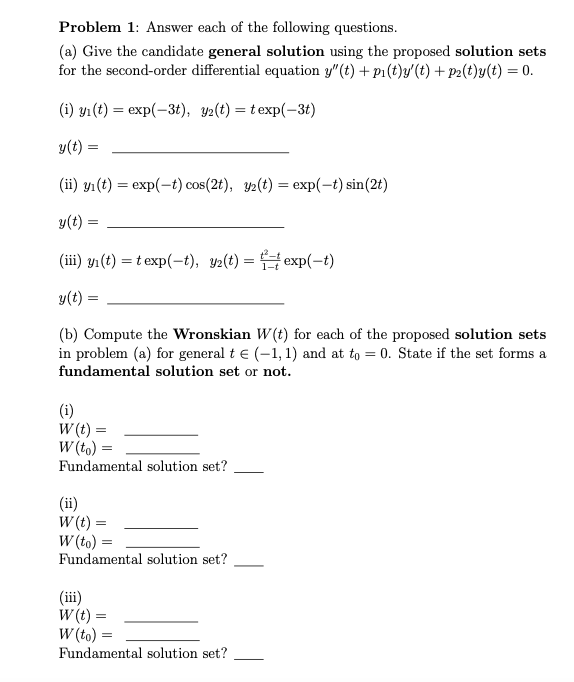Problem 1: Answer each of the following questions. (a) Give the candidate general solution using the proposed solution sets for the second-order differential equation y"(t) + pı (t)y'(t) + P2(t)y(t) = 0. (i) yı (t) = exp(-3t), y2(t) = texp(-3t) y(t) = (ii) yı(t) = exp(-t) cos(2t), y2(t) = exp(-t) sin(2t) y(t) = (iii) y1(t) = t exp(-t), y2(t) = exp(-t) y(t): (b) Compute the Wronskian W(t) for each of the proposed solution sets in problem (a) for general t e (-1, 1) and at to = 0. State if the set forms a fundamental solution set or not. (i) W (t) = W (to) = Fundamental solution set?
Problem 1: Answer each of the following questions. (a) Give the candidate general solution using the proposed solution sets for the second-order differential equation y"(t) + pı (t)y'(t) + P2(t)y(t) = 0. (i) yı (t) = exp(-3t), y2(t) = texp(-3t) y(t) = (ii) yı(t) = exp(-t) cos(2t), y2(t) = exp(-t) sin(2t) y(t) = (iii) y1(t) = t exp(-t), y2(t) = exp(-t) y(t): (b) Compute the Wronskian W(t) for each of the proposed solution sets in problem (a) for general t e (-1, 1) and at to = 0. State if the set forms a fundamental solution set or not. (i) W (t) = W (to) = Fundamental solution set?
Calculus: Early Transcendentals
8th Edition
ISBN:9781285741550
Author:James Stewart
Publisher:James Stewart
Chapter1: Functions And Models
Section: Chapter Questions
Problem 1RCC: (a) What is a function? What are its domain and range? (b) What is the graph of a function? (c) How...
Related questions
Question

Transcribed Image Text:Problem 1: Answer each of the following questions.
(a) Give the candidate general solution using the proposed solution sets
for the second-order differential equation y"(t) + pı (t)y'(t) + P2(t)y(t) = 0.
(i) yı (t) = exp(-3t), y2(t) = texp(-3t)
y(t) =
(ii) yı(t) = exp(-t) cos(2t), y2(t) = exp(-t) sin(2t)
y(t) =
(iii) y1(t) = t exp(-t), y2(t) = exp(-t)
y(t):
(b) Compute the Wronskian W(t) for each of the proposed solution sets
in problem (a) for general t e (-1, 1) and at to = 0. State if the set forms a
fundamental solution set or not.
(i)
W (t) =
W (to) =
Fundamental solution set?
(ii)
W (t) =
W (to) =
Fundamental solution set?
(ii)
W (t) =
W (to) =
Fundamental solution set?
Expert Solution
This question has been solved!
Explore an expertly crafted, step-by-step solution for a thorough understanding of key concepts.
Step by step
Solved in 2 steps with 1 images

Recommended textbooks for you

Calculus: Early Transcendentals
Calculus
ISBN:
9781285741550
Author:
James Stewart
Publisher:
Cengage Learning

Thomas' Calculus (14th Edition)
Calculus
ISBN:
9780134438986
Author:
Joel R. Hass, Christopher E. Heil, Maurice D. Weir
Publisher:
PEARSON

Calculus: Early Transcendentals (3rd Edition)
Calculus
ISBN:
9780134763644
Author:
William L. Briggs, Lyle Cochran, Bernard Gillett, Eric Schulz
Publisher:
PEARSON

Calculus: Early Transcendentals
Calculus
ISBN:
9781285741550
Author:
James Stewart
Publisher:
Cengage Learning

Thomas' Calculus (14th Edition)
Calculus
ISBN:
9780134438986
Author:
Joel R. Hass, Christopher E. Heil, Maurice D. Weir
Publisher:
PEARSON

Calculus: Early Transcendentals (3rd Edition)
Calculus
ISBN:
9780134763644
Author:
William L. Briggs, Lyle Cochran, Bernard Gillett, Eric Schulz
Publisher:
PEARSON

Calculus: Early Transcendentals
Calculus
ISBN:
9781319050740
Author:
Jon Rogawski, Colin Adams, Robert Franzosa
Publisher:
W. H. Freeman


Calculus: Early Transcendental Functions
Calculus
ISBN:
9781337552516
Author:
Ron Larson, Bruce H. Edwards
Publisher:
Cengage Learning